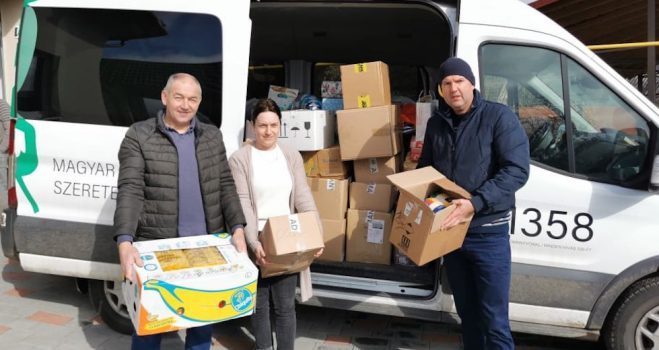Even as the first of potentially millions of Ukrainians sought refuge outside of their country, members and partners of the World Communion of Reformed Churches were responding to their needs.
“It is good that we have cultivated contacts with the brothers and sisters in Ukraine in recent years. Many close relationships have developed from this,” said Martina Wasserloos, president of WCRC Europe. “The willingness of our member churches in Eastern Europe to help is overwhelming. They are preparing to take in and care for refugees, although they are very worried themselves”
Speaking from inside Ukraine, Sándor Zán-Fábián, head of the Reformed Church in Transcarpathia, said, “We also live in insecurity and fear, so anybody can try to leave the country. Basically, the elderly generation has remained; we have to care for them, along with the refugees seeking shelter in our region. It is an unprecedented, difficult situation here. Let us care for one another, remain humane, helpful, and patient.”
Hungarian Reformed Church Aid, which is providing daily updates on its activities, delivered 800 kilograms of food to the Ukrainian-Hungarian border on Thursday with more following over the weekend. At the same time, the organization started a nationwide fundraising campaign to help those in need in Ukraine.
“Our hope is to create a humanitarian corridor, to use it both ways,” said Balász Ódor, ecumenical officer of the Reformed Church in Hungary. “We have warehouses around the border to transport supplies to Ukraine. Our refugee ministry is working closely together with the church aid to coordinate efforts.”
“The Romanian government is prepared to receive refugees from Ukraine, and our church is also preparing itself to contribute in this relief action,” said Tibor Kiss, ecumenical officer of the Transylvanian Reformed Church District in Romania. “We assure our brothers and sisters in Ukraine of our help as much as we are able to help.”
“We have had a joint meeting with our diakonia and have decided on several tracks to be able to support, though we are not a frontline country,” said Jiří Schneider, synod curator of the Evangelical Church of Czech Brethren. “We suspect the refugees will seek refuge with their relatives and friends. It’s not going to be an anonymous immigration but very targeted. Hence, we are trying to reach out to our friends from Ukraine to help on an individual basis.”
Prior to the Russian invasion, coordinated efforts were underway to provide support to churches and non-profit organizations (NGOs) in Ukraine.
“With the WCRC’s global office we had begun a process to connect ecumenical church organizations and NGO’s. Our idea was to go to Ukraine to show solidarity, to connect us with them for the next years in doing things together,” said Wasserloos. “At this moment the visit is not possible, but we will not give up the idea to look for what we can do together —be it in joint projects or various forms of cooperation.
“I am currently receiving urgent requests to also provide financial help to make aid possible. I am in close contact with our brothers and sisters in Transcarpathia, so that we receive daily updates on what is happening and how we can help,” said Wasserloos.
The Ukrainian Educational Platform (UEP) is one of the NGOs with which WCRC Europe has been working. The UEP develops Ukrainian society through creating and supporting a network of volunteer, social, and educational initiatives, including with churches across the country.
“Civil institutions are being attacked, including where people live who aren’t so mobile,” reported one UEP leader. “One of the most important changes now is that civic society is really under risk.”
“We are in full-scale crisis mode,” reported another UEP leader. “Our staff team are coordinating and transforming their work, gathering both needs and potential partner organizations” even as they relocate from the east to the west. Localized needs remain a priority, “providing support to even those who haven’t moved much.”
The WCRC’s Reformed Partnership Fund will provide financial assistance to relief efforts, while ACT Alliance, of which the WCRC is a global partner, has begun delivering emergency supplies through its members.
“For God’s sake, we must not stop working for peace, praying for peace, and resisting violence—continuously and persistently,” said Wasserloos.
Image courtesy of Hungarian Reformed Church Aid.


